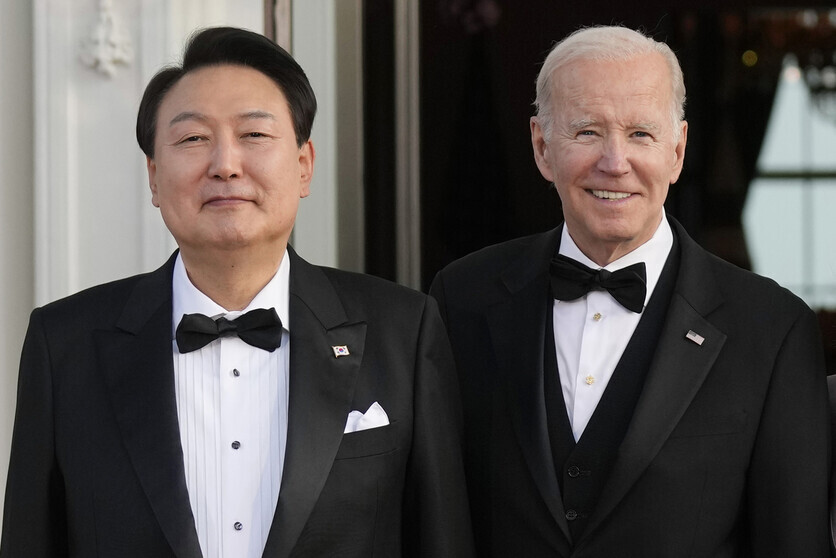hankyoreh
Links to other country sites 다른 나라 사이트 링크
Joint statements with US put Korea in middle of US-China conflict

The joint statement that the leaders of South Korea and the US released following their summit on Wednesday makes numerous references to China-related issues, including the Taiwan Strait, semiconductors and AUKUS. The language about the Taiwan Strait in this statement is more specific and concrete than in previous ones, reflecting the gravity of the security situation there.
“The Presidents reiterated the importance of preserving peace and stability in the Taiwan Strait as an indispensable element of security and prosperity in the region,” the statement said, even though China had fiercely objected to Korean President Yoon Suk-yeol’s mention of Taiwan in an interview with Reuters on April 19.
“They strongly opposed any unilateral attempts to change the status quo in the Indo-Pacific, including through unlawful maritime claims, the militarization of reclaimed features and coercive activities,” the statement also said.
The first time the Taiwan Strait was mentioned in a joint statement by the Korean and American presidents was in May 2021, during the presidency of Moon Jae-in. That statement said that “President Biden and President Moon emphasize the importance of preserving peace and stability in the Taiwan Strait.”
The language in the latest statement is considerably different from that. The reason that’s now given for “preserving peace and stability in the Taiwan Strait” is “security and prosperity in the region.” It’s reasonable to interpret “region” in connection with peace in the Taiwan Strait as including the Korean Peninsula.
In other words, Biden and Yoon effectively announced that maintaining peace and stability in the Taiwan State is also essential for the security and prosperity of the Korean Peninsula.
However, the two leaders’ opposition to “any unilateral attempts to change the status quo” has been expanded from Taiwan, which Yoon mentioned in his interview with Reuters, to the Indo-Pacific, which includes the South China Sea.
In addition, the joint statement omits a comment about the Taiwan Strait being an international issue, which could be mistaken as rejecting the “one China principle” held by China.
The joint statement also makes specific mention of semiconductors, which have emerged as a key element in the conflict between the US and China.
Yoon and Biden “reaffirmed the importance of deepening cooperation between our foreign investment screening and export control authorities,” in what was basically a reference to semiconductors. That amounted to a pledge to cooperate more closely on export controls and semiconductor investments in China.
The two leaders went a step further by announcing the establishment of a Next Generation Critical and Emerging Technologies Dialogue to be led by their respective national security advisors with the goal of improving economic security. That’s also basically aimed at facilitating a joint response to China on economic and technological matters.
In the statement, Yoon also voiced his support for AUKUS, the security pact that the US, UK and Australia have set up against China. “President Yoon expressed support for the United States’ cooperative efforts to ensure peace and security in the region, including through the launch of AUKUS.”
As for the Washington Declaration, which was released on the same day, a senior official from Korea’s presidential office said, “China need not worry or take issue with that because it represents an alliance contingency plan against the threat posed by North Korea’s nuclear weapons and missiles.”
“The US provided China with an explanation a couple of days in advance,” the official said.
By Choi Hyun-june, Beijing correspondent
Please direct questions or comments to [english@hani.co.kr]

Editorial・opinion
![[Column] Samsung’s ‘lost decade’ and Lee Jae-yong’s mismatched chopsticks [Column] Samsung’s ‘lost decade’ and Lee Jae-yong’s mismatched chopsticks](https://flexible.img.hani.co.kr/flexible/normal/500/300/imgdb/original/2024/0512/3017154788490114.jpg) [Column] Samsung’s ‘lost decade’ and Lee Jae-yong’s mismatched chopsticks
[Column] Samsung’s ‘lost decade’ and Lee Jae-yong’s mismatched chopsticks![[Correspondent’s column] The real reason the US is worried about Chinese ‘overcapacity’ [Correspondent’s column] The real reason the US is worried about Chinese ‘overcapacity’](https://flexible.img.hani.co.kr/flexible/normal/500/300/imgdb/original/2024/0510/5217153290112576.jpg) [Correspondent’s column] The real reason the US is worried about Chinese ‘overcapacity’
[Correspondent’s column] The real reason the US is worried about Chinese ‘overcapacity’- [Editorial] Yoon’s gesture at communication only highlights his reluctance to change
- [Editorial] Perilous stakes of Trump’s rhetoric around US troop pullout from Korea
- [Guest essay] Preventing Korean Peninsula from becoming front line of new cold war
- [Column] The state is back — but is it in business?
- [Column] Life on our Trisolaris
- [Editorial] Penalties for airing allegations against Korea’s first lady endanger free press
- [Editorial] Yoon must halt procurement of SM-3 interceptor missiles
- [Guest essay] Maybe Korea’s rapid population decline is an opportunity, not a crisis
Most viewed articles
- 1[Column] Samsung’s ‘lost decade’ and Lee Jae-yong’s mismatched chopsticks
- 2[Correspondent’s column] The real reason the US is worried about Chinese ‘overcapacity’
- 3Seoul’s plan to adopt SM-3 missiles is like wanting a sledgehammer to catch a fly
- 4S.K.-Japan joint history project to be revived
- 5With Naver’s inside director at Line gone, buyout negotiations appear to be well underway
- 6Yoon rejects calls for special counsel probes into Marine’s death, first lady in long-awaited presse
- 7[Book review] Who said Asians can’t make some good trouble?
- 8Samsung heiress Lee Bu-jin divorces husband
- 9Report documents instances of lonely deaths in South Korean society
- 10New documentary series pushes back against stereotypes of K-pop industry by digging deep